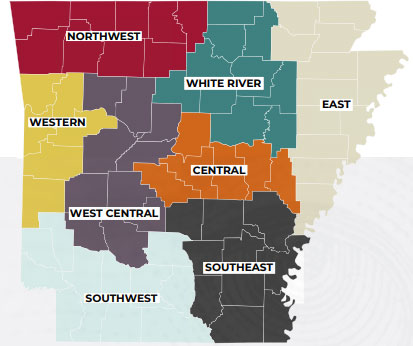Following a nationwide trend, Arkansas entrepreneurs experienced an influx of seed funding in 2021, although there was a dearth of funding for female founders, according to a report from the Office of Entrepreneurship and Innovation analyzing Arkansas' startup capital.
The 2021 Arkansas Capital Scan found that about 90% of seed funding went to white male founders, with roughly 10% going to businesses started by people who were both women and people of color. Similar demographic disparities were seen among neighboring states Missouri, Oklahoma and Tennessee. The report, developed by the Office of Entrepreneurship and Innovation in partnership with the Department of Finance in the Sam M. Walton College of Business, also found demographic and geographic disparities in venture capital funding.
Of the state's 11 businesses receiving later-stage (i.e. not angel or seed stage) venture capital funding, all but one were owned by white men. The other was founded and owned by a man of color; no women-owned business received venture capital funding. Northwest Arkansas received the bulk of venture capital, with only two cities outside of the region receiving venture capital deals.
The report noted these demographic and geographic funding disparities in venture capital could have long-term repercussions on the building of wealth and overall vitality of Arkansas' economy. Citing a study from the McKinsey Institute for Black Economic Mobility, racial and gender wealth gaps could cost the U.S. between 4-6% of projected GDP by 2028.
Despite overall disparities, the report noted signals of an economic revitalization in Pine Bluff, which is gaining recognition for its local sales tax initiative that city leaders designed to spark investments downtown. Located in southeast Arkansas, Pine Bluff's reemergence was also assisted by Angelica Perkins-Walton, a U of A-Pine Bluff graduate and social media influencer, who helped raise awareness about the city's Black-owned businesses, according to the report. Released for the second consecutive year, the Arkansas Capital Scan is intended to be an annual effort examining the capital resources flowing into small businesses, startups and growth companies in Arkansas over the course of a calendar year.
"We endeavored to develop a landscape scan in an effort to understand deal flow and identify gaps and opportunities for new programs and policies to attract investment to Arkansas businesses," said Tiffany Henry, instructional designer of training and workshops in the Office of Entrepreneurship and Innovation, who supported the development of the report.
The team, which included students from the Department of Finance and a statewide advisory board, collected data from a variety of sources, including Pitchbook, SEC filings, national and state databases, interviews and surveys.
Insights from the 2021 Capital Scan
 NWA continues to drive the majority of Arkansas' venture capital funding (p. 32)
NWA continues to drive the majority of Arkansas' venture capital funding (p. 32)- The total angel and seed funding going to Central Arkansas firms more than tripled (p. 20)
- Arkansas' average angel/seed deal size surpassed neighboring states of Missouri, Oklahoma and Tennessee (p. 19)
- Equity-based investments in Arkansas across all stages (seed, angel, early-stage VC and late-stage VC) significantly eclipsed 2020 (p. 28)
- Black women in Arkansas outpace other demographic groups in business creation, but still face an enormous wealth gap compared to companies of white men (p. 14)
- The number of angel/seed deals for women of color in Arkansas increased from five to 14 (p. 23)
About the U of A Office of Entrepreneurship and Innovation: The Office of Entrepreneurship and Innovation creates and curates innovation and entrepreneurship experiences for students across all disciplines. Through the Brewer Family Entrepreneurship Hub, McMillon Innovation Studio, Startup Village, and Greenhouse at the Bentonville Collaborative, OEI provides free workshops and programs — including social and corporate innovation design teams, venture internships, competitions and startup coaching. A unit of the Sam M. Walton College of Business and Division of Economic Development, OEI also offers on-demand support for students who will be innovators within existing organizations and entrepreneurs who start something new.
Topics
Contacts
Brandon Howard, communications and social media specialist
Office of Entrepreneurship and Innovation
479-418-4803,
